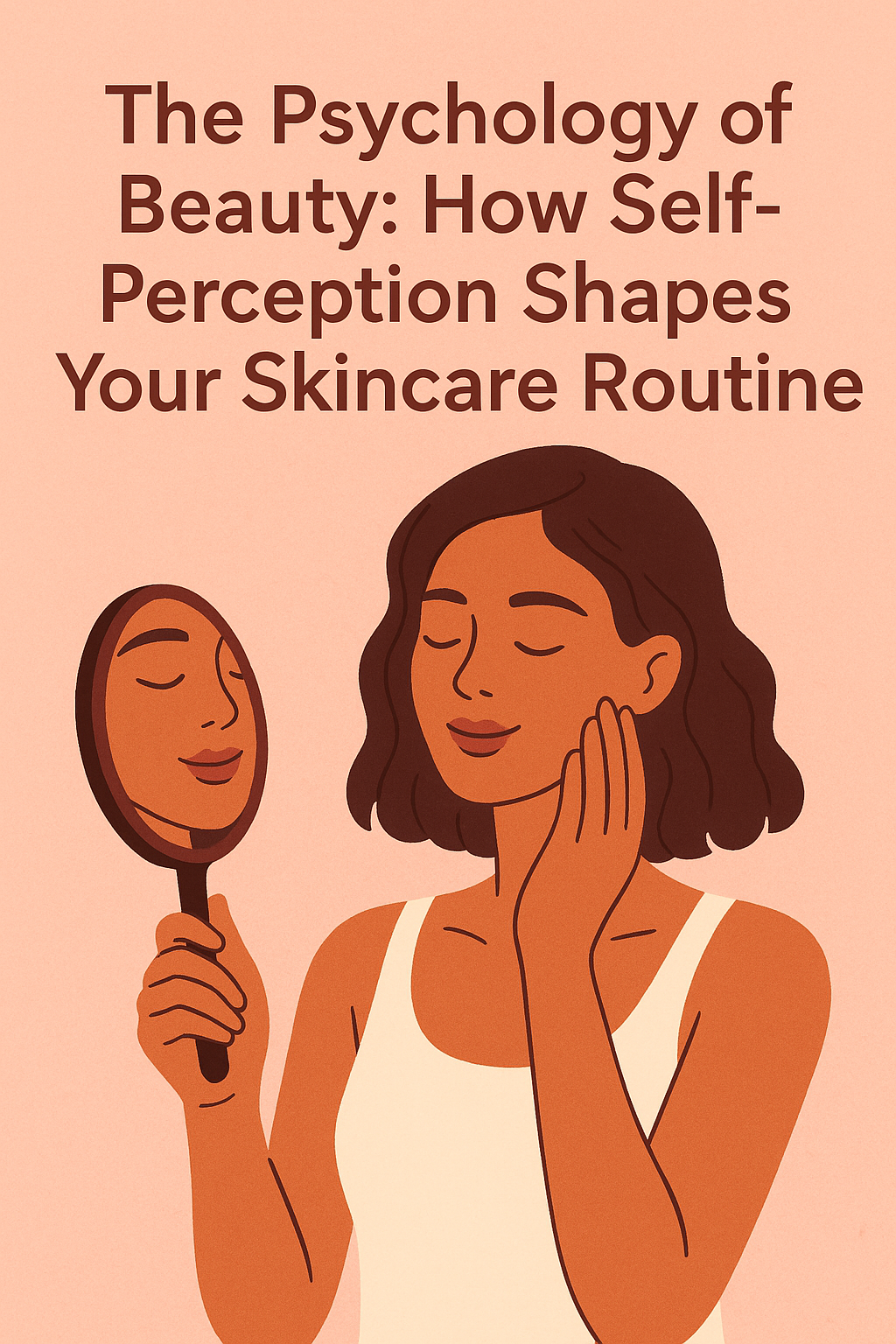Beauty has always been more than just skin deep. It is a reflection of how we see ourselves, how we believe others see us, and how we express our inner identity to the outside world. In recent years, beauty has shifted away from being purely about physical appearance and has begun to intersect with mental health, self-esteem, and emotional wellbeing. At the heart of this shift lies the psychology of beauty—an exploration of how self-perception influences our choices, behaviors, and even the way we approach skincare.
When you stand in front of the mirror, the image you see is often filtered through the lens of your self-image. Do you notice imperfections, or do you focus on the features you love? That answer can significantly impact not only your confidence but also the way you design your skincare routine. For many, skincare is more than cleansing or moisturizing—it’s an act of self-love, a ritual that reinforces confidence, and in some cases, a way to cope with stress or low self-esteem. For others, however, negative self-perception can lead to overcompensating, overusing products, or constantly chasing unrealistic ideals set by society and media.
Psychologists call this the “beauty–self-esteem connection”, and it’s more powerful than most of us realize. Our routines are not simply shaped by what our skin needs biologically; they’re also shaped by what our minds crave emotionally. Skincare can become a tool of empowerment or, if self-perception is negative, a cycle of dissatisfaction.
This article explores how psychology and beauty intertwine. We’ll uncover how self-perception affects skincare habits, why confidence leads to healthier choices, and how to reframe beauty in a way that nurtures—not pressures—your relationship with your skin. By the end, you’ll understand that your skincare routine is not just about taking care of your skin, but about building a healthier, more compassionate relationship with yourself.
1. The Role of Self-Perception in Beauty
- How we see ourselves is rarely neutral. Every glance in the mirror is influenced by years of experiences, cultural messages, personal beliefs, and emotions. This “inner mirror” shapes the way we value beauty, and in turn, how we approach our skincare routine. Understanding the psychology of self-perception allows us to see why some people treat skincare as a loving ritual while others treat it as a battle against flaws.
- 1. The Internal Mirror
- Self-perception is essentially the story we tell ourselves about our appearance. Two people may look at the same skin concern—say, a small blemish—and interpret it very differently. One may see it as temporary and normal, while the other may see it as a sign of imperfection that damages their self-worth. These interpretations often come not from the skin itself but from the inner dialogue shaped by self-esteem.
- This internal mirror influences whether skincare becomes an act of kindness or an act of criticism. People with a positive self-image often use skincare as a form of nurturing, focusing on how it makes them feel. Those with a negative self-image may approach skincare more aggressively, chasing “fixes” rather than embracing care.
- 2. The Confidence Loop
- Self-perception and skincare create what psychologists call a feedback loop. When you feel confident, you’re more likely to maintain consistent, balanced skincare habits. Those habits, over time, improve your skin’s health, which reinforces your confidence. It’s a cycle that supports both the skin and the mind.
- On the other hand, low self-esteem can disrupt this loop. Inconsistent routines, product-hopping, or neglect can worsen skin conditions, which then reinforces negative self-perception. This creates a downward spiral that affects both confidence and skin health.
- 3. Negative Self-Talk and Its Impact
- The voice in your head plays a huge role in how you treat your skin. Negative self-talk—phrases like “my skin is ugly” or “I’ll never look good enough”—can drive destructive skincare behaviors such as over-exfoliation, excessive product layering, or compulsively trying every new trend. These actions, while fueled by a desire to “fix” flaws, often damage the skin barrier and lead to more issues.
- By contrast, positive affirmations and self-compassion can transform the same skincare routine into a therapeutic ritual. Instead of seeing skincare as a punishment for not being perfect, it becomes a gentle reminder that you are worthy of care just as you are.
- 4. Beyond Vanity: Skincare as Identity
- For many people, skincare is tied to identity and self-expression. A person who views themselves as “disciplined” may take pride in a structured, consistent routine. Someone who sees themselves as “natural” may embrace minimalist skincare. These choices reflect self-perception and how individuals want to be seen by the world.
- Ultimately, self-perception shapes not just how we care for our skin, but how we carry ourselves, how we present our beauty, and how we connect with others.
2. Psychological Influences on Skincare Habits
- Our skincare routines may seem like a matter of products and steps, but in reality, they are deeply influenced by psychological factors. From cultural pressures to emotional coping mechanisms, the way we treat our skin often reflects what’s happening in our minds. Understanding these influences can help us recognize when our skincare habits are healthy and when they may be driven by unrealistic expectations or stress.
- 1. Cultural Beauty Standards
- One of the strongest psychological influences on skincare is the cultural definition of beauty. Social media, advertising, and even family beliefs play a role in shaping what we consider “beautiful skin.” In some cultures, flawless porcelain-like skin is idealized, while in others, a natural sun-kissed glow is preferred. These ideals often drive consumer behavior—pushing people toward specific routines, treatments, or even cosmetic procedures.
- The challenge with cultural standards is that they can create unrealistic expectations. For instance, filters and editing apps make skin appear poreless and perfectly even-toned, leading many to chase results that are biologically impossible. When self-perception is compared against these digital standards, skincare habits may shift from self-care to self-punishment.
- 2. Emotional Skincare
- For many, skincare is more than hygiene—it’s an emotional response. During periods of stress, sadness, or anxiety, people may turn to skincare as a coping mechanism. Applying a soothing face mask after a difficult day can feel like a small act of healing. The sensory experiences—cooling textures, calming scents, gentle touch—activate the nervous system and reduce stress.
- However, the opposite can also be true. In moments of low self-esteem, individuals may neglect skincare altogether, avoiding mirrors and skipping routines because they don’t feel “worth the effort.” This reflects how emotions directly impact consistency and quality of care.
- 3. Reward and Ritual
- Psychologists emphasize the importance of rituals in creating emotional stability. Skincare, for many, functions as a grounding ritual. The repetitive, predictable steps of cleansing, moisturizing, or applying serums can provide comfort in a chaotic world. It gives a sense of control, structure, and accomplishment, especially when other areas of life feel uncertain.
- For some, skincare becomes a form of reward. Completing a routine at the end of the day feels like closing a chapter and rewarding oneself for getting through. This reward-based psychology explains why so many people describe skincare as “me time”—a pocket of the day reserved solely for themselves.
- 4. The Influence of Personality Traits
- Psychological research also shows that personality traits shape skincare habits:
- Perfectionists may lean toward elaborate, multi-step routines, constantly searching for the “perfect” product.
- Minimalists may prefer a simple three-step routine and focus on consistency rather than variety.
- Experimenters enjoy trying new products and trends, using skincare as a way of expressing curiosity and creativity.
- These differences highlight that skincare is not only physical but also a reflection of personality and psychological preferences.
- 5. The Role of Social Comparison
- Social comparison is another factor influencing skincare habits. Seeing influencers with glowing, “glass skin” can spark inspiration, but it can also trigger feelings of inadequacy. Many people unconsciously adjust their routines to match trends rather than focusing on their own skin’s needs. This can lead to wasted money, product overload, and even skin irritation.
- Becoming aware of this psychological influence helps individuals re-center their routines around personal care rather than comparison-driven consumption.
3. Positive Self-Perception and Healthy Routines
- When we look at beauty through the lens of psychology, one pattern becomes clear: people who view themselves positively tend to have healthier and more consistent skincare habits. This doesn’t mean they have flawless skin—it means they approach their skin with compassion, patience, and realistic expectations. Self-perception, when rooted in acceptance, transforms skincare from a battle into a ritual of care.
- 1. Self-Acceptance as the Foundation
- Self-acceptance doesn’t mean ignoring imperfections; it means understanding that skin is a living organ that changes daily. Breakouts, dryness, and sensitivity are natural responses to stress, hormones, or environment—not signs of failure. Those with positive self-perception see skincare as a way to support their skin through its ups and downs, rather than as a way to erase every perceived flaw.
- This mindset creates freedom. Instead of obsessing over instant fixes, they adopt sustainable habits—gentle cleansing, consistent hydration, and sun protection—that nurture the skin over time.
- 2. Simplicity and Balance
- Confidence often leads to simplicity. People with a balanced self-image don’t feel pressured to follow every trend or buy every new product. Instead, they focus on what works for their skin. This usually results in routines that are:
- Simple: A cleanser, moisturizer, and SPF may be enough.
- Consistent: They stick to a manageable routine instead of constantly switching products.
- Balanced: They know when to treat themselves to masks or treatments without overdoing it.
- This simplicity prevents irritation, product fatigue, and the mental stress of chasing perfection.
- 3. The Emotional Boost of Skincare
- Positive self-perception enhances the emotional benefits of skincare. Each step feels less like a chore and more like a treat. Applying moisturizer becomes an act of kindness, not an attempt to “fix” oneself. This emotional framing matters: when skincare feels nurturing, it strengthens both the skin barrier and the mental barrier against stress.
- For example, someone who sees themselves with compassion may pair their evening skincare with a calming ritual—soft music, a candle, or affirmations. The result is not just healthier skin, but reduced anxiety and improved sleep quality.
- 4. Healthy Boundaries with Trends
- Another sign of positive self-perception is the ability to enjoy trends without being consumed by them. Instead of chasing every “glass skin” routine they see online, they ask: Does this align with my skin’s needs? This boundary prevents overspending, overexfoliation, or disappointment when results don’t match edited photos.
- By focusing on their unique skin journey, they create a routine that’s authentic, sustainable, and emotionally fulfilling.
- 5. Long-Term Results Over Quick Fixes
- Confidence allows people to focus on long-term results rather than instant gratification. Instead of expecting one serum to “change everything overnight,” they trust the process of gradual improvement. This patience prevents frustration and keeps skincare rooted in realistic, science-backed practices.teem are more likely to:
- Stick to simple, effective routines.
- Avoid harmful fads or excessive treatments.
- Embrace skincare as self-care, not self-criticism.
4. The Dangers of Negative Self-Perception
- While positive self-perception can create balance and empowerment, the opposite can be just as powerful in a harmful way. Negative self-perception—seeing one’s appearance through a harsh, critical lens—can trap individuals in cycles of dissatisfaction, unrealistic expectations, and damaging skincare habits. Instead of skincare being an act of love, it becomes a punishment for not being “good enough.”
- 1. Overuse and Misuse of Products
- One of the most common outcomes of negative self-perception is over-treatment. Driven by the belief that their skin is never flawless, individuals may layer multiple serums, exfoliate daily, or jump between products without giving them time to work. This “more is better” mentality often damages the skin barrier, leading to irritation, redness, or worsening breakouts.
- Ironically, the very effort to fix perceived flaws often creates more problems—reinforcing the negative self-image and creating a vicious cycle.
- 2. Falling Into Comparison Traps
- Negative self-perception thrives in environments of comparison. Social media filters, celebrity endorsements, and influencer culture often set unrealistic standards of poreless, glowing skin. Those with low self-esteem may constantly compare themselves to these images, forgetting that many are digitally enhanced or the result of expensive treatments.
- This comparison trap doesn’t just affect skincare routines—it affects mental health, creating feelings of inadequacy, envy, and discouragement.
- 3. Emotional Burnout from Skincare
- When skincare is driven by criticism instead of care, it stops being a soothing ritual and becomes an exhausting obligation. People may feel guilty if they skip a step or stressed if their skin doesn’t immediately improve. This emotional burnout removes the joy from skincare and transforms it into a constant reminder of insecurity.
- Instead of creating peace, the bathroom mirror becomes a battleground.
- 4. The Risk of Skin Picking and Compulsive Behaviors
- In severe cases, negative self-perception can lead to compulsive skincare behaviors, such as skin picking, over-cleansing, or obsessively checking the mirror. Psychologists identify conditions like body dysmorphic disorder (BDD), where individuals fixate on perceived flaws, as an extreme manifestation of negative self-perception. These behaviors not only harm the skin physically but also increase shame and distress.
- 5. Financial Strain and Product Dependency
- Another danger lies in the constant search for a “miracle product.” When people believe their skin is deeply flawed, they may spend excessive amounts of money chasing quick fixes. This can create financial stress and emotional disappointment when results don’t match expectations. Skincare becomes less about health and more about consumer-driven desperation.
- 6. Perpetuating a Negative Feedback Loop
- All of these factors—overuse, comparison, emotional burnout, compulsive habits, and financial strain—feed into a negative feedback loop. Damaged skin or unmet expectations reinforce negative self-talk, which drives more extreme skincare behaviors, which further harm the skin. Breaking this loop requires a shift in perception: seeing skincare not as a punishment but as an opportunity for compassion.
5. Reframing Beauty Through Psychology
- The way we view ourselves isn’t set in stone. Self-perception is shaped by experiences, culture, and thought patterns—but it can also be reshaped. By using tools from psychology, individuals can reframe beauty in a way that supports emotional well-being and healthy skincare routines. Instead of chasing perfection, the focus shifts toward self-acceptance, mindful habits, and authenticity.
- 1. Mindfulness in Skincare
- Mindfulness—being fully present in the moment—can transform skincare from a rushed checklist into a grounding ritual. Instead of quickly applying products while thinking about work or scrolling on the phone, mindfulness encourages slowing down. Paying attention to textures, scents, and sensations creates a deeper connection between body and mind.
- This simple shift reduces stress, enhances relaxation, and strengthens the idea that skincare is self-care, not self-criticism.
- 2. Challenging Unrealistic Standards
- Psychology teaches us that cognitive reframing—changing how we interpret situations—can break harmful thought patterns. Instead of thinking, “I need perfect skin to feel attractive,” we can reframe to: “My skin reflects my health and care, not my worth.”
- By actively questioning cultural beauty standards and social media comparisons, people can protect themselves from unrealistic expectations. This doesn’t mean ignoring trends entirely, but approaching them with curiosity rather than pressure.
- 3. The Power of Affirmations
- Positive affirmations, when practiced consistently, can reshape self-perception. Phrases like “My skin is worthy of care,” or “I am more than my appearance” may seem simple, but they help rewire negative self-talk. Pairing affirmations with daily skincare creates a powerful psychological anchor, turning each routine into a confidence-building exercise.
- 4. Focusing on Function, Not Just Appearance
- Reframing beauty also means shifting focus from how skin looks to how it functions. Healthy skin doesn’t always mean blemish-free skin—it means skin that protects, heals, and adapts. By appreciating the resilience of the skin as an organ, individuals can view their routines as acts of support rather than cosmetic corrections.
- For example, applying sunscreen becomes less about avoiding wrinkles and more about protecting the body’s largest organ from harm. This shift encourages sustainable, science-backed habits.
- 5. Embracing Individuality
- Psychology highlights the value of self-compassion and authenticity. Instead of conforming to every standard, reframing beauty means embracing individuality. Skin tone, texture, scars, and freckles are not flaws—they are markers of uniqueness. By reframing them as part of one’s story, people can build a stronger sense of identity and pride in their appearance.
- 6. Creating a Self-Care Narrative
- Finally, reframing beauty involves creating a personal self-care narrative. Instead of seeing skincare as an endless struggle, individuals can write their own story: one where skincare is a ritual of kindness, a moment of calm, and a reflection of self-love. This narrative strengthens resilience against external pressures and fosters long-term emotional wellness.
6. Building a Healthy Relationship with Your Skin
- Simplify: Choose a routine that feels manageable and kind.
- Listen to Your Skin: Pay attention to its needs rather than trends.
- Celebrate Progress: Value small improvements and the ritual itself.
- Seek Balance: Recognize that perfection isn’t the goal—wellbeing is.
Conclusion
Beauty psychology teaches us that skincare is more than creams and serums—it’s a reflection of how we perceive ourselves. When we nurture a healthy self-image, our skincare routines transform from being acts of correction into rituals of celebration. True beauty emerges when self-perception shifts from criticism to compassion, allowing skincare to become not just a routine but a journey of self-love.









